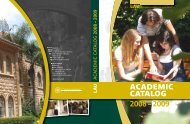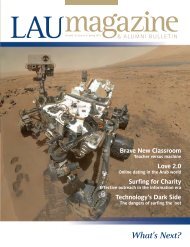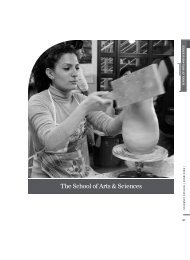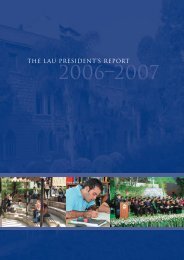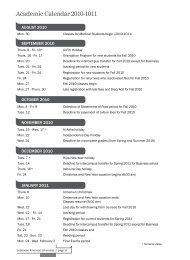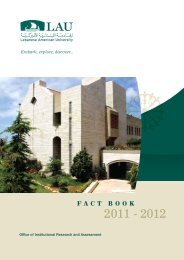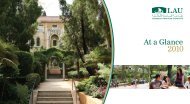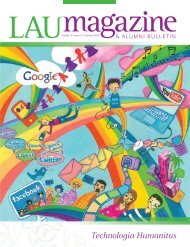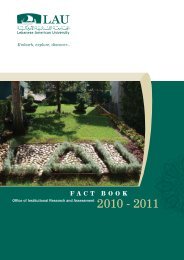academic-catalog2011.. - LAU Publications - Lebanese American ...
academic-catalog2011.. - LAU Publications - Lebanese American ...
academic-catalog2011.. - LAU Publications - Lebanese American ...
Create successful ePaper yourself
Turn your PDF publications into a flip-book with our unique Google optimized e-Paper software.
Department of Humanities<br />
PHL 210 Critical and Creative Thinking<br />
Students will be taught how to read out<br />
arguments in ordinary language – for instance<br />
in opinion pieces in newspapers and magazines<br />
or in short philosophical passages – and to<br />
identify the kind of argument, and to analyze and<br />
evaluate those arguments. Students will also<br />
be introduced to formal modes of reasoning in<br />
categorical and symbolic logic. Finally, students<br />
will be trained in thinking creatively about<br />
certain passages from the established great<br />
figures in the philosophical tradition.<br />
PHL 211 Symbolic Logic<br />
This course introduces the concepts and<br />
principles of symbolic logic, in particular the<br />
distinction between valid and invalid arguments,<br />
the determination of logical relations between<br />
sentences, the formal analysis of sentences<br />
so that the logical relations between them can<br />
be determined, the definition and construction<br />
of a formal language, the evaluation of truth,<br />
truth-functions, quantifiers and their use in the<br />
analysis of arguments, and predicate logic.<br />
PHL301 Ethics<br />
Ethics is classically the study of what is right, just,<br />
appropriate, or desirable, all of which are among<br />
the various meanings given to “the good”, the<br />
central concern of ethics. Typically, this course<br />
will have historical, theoretical, and applied<br />
dimensions: the historical dimension will provide<br />
acquaintance with the various kinds of ethical<br />
and moral theory that have emerged over the last<br />
two and half millennia; the theoretical dimension<br />
will examine the content of these ideas closely;<br />
and the applied dimension will sharpen the<br />
student’s ability to think through distinctively<br />
ethical and moral problems.<br />
PHL302 Theory of Knowledge<br />
Theory of knowledge, known as “epistemology”,<br />
is a fundamental and enduringly significant<br />
branch of philosophy. Despite many historical<br />
transformations (some of which will be examined),<br />
it has had stable aims, among which are the<br />
definition of knowledge, the distinction between<br />
knowledge and belief, the methodologies and<br />
procedure by which knowledge is acquired, and<br />
how to deal with skepticism. These issues will<br />
be raised and explored with reference to both<br />
ancient and modern texts.<br />
PHL303 Metaphysics<br />
Metaphysics is the broad philosophical study<br />
of the basic form, structure, essence, and<br />
elements of reality or “being”, and in its classical<br />
form it tries to provide a unified account of how<br />
the cosmos hangs together and what makes<br />
the cosmos what it is. This course may variously<br />
emphasize metaphysical topics in religion,<br />
physics, and/or mind. Overall, the course will<br />
survey philosophers’ quest to grasp the basic<br />
nature of reality (perhaps with that of some<br />
physicists and biologists who have recently<br />
joined philosophers in their timeless quest).<br />
PHL 311 Philosophy of Religion<br />
This course will address fundamental<br />
philosophical questions arising from all major<br />
religions in the worlds, including the three<br />
Abrahamic faiths as well as the older Asian<br />
traditions such as Hinduism, Buddhism,<br />
Confucianism, and Daoism. The course will<br />
deal with common religious themes such as<br />
Transcendence (or the Sacred or Mystery),<br />
religious experience, religious language,<br />
symbolism, the relationship between faith<br />
and reason, the relationship between science,<br />
mythology, and religion, and religious pluralism.<br />
PHL321 Philosophy of Art<br />
The course deals with (1) how we can discern<br />
whether something qualifies as art, in what<br />
sense our aesthetic judgments are subjective<br />
or objective, what qualifies as a good, bad,<br />
correct, or an incorrect interpretation of an<br />
artwork, and whether we can learn from art<br />
(epistemological issues); (2) the nature of<br />
art and artworks and the kinds of experience<br />
associated with them, how art relates to reality,<br />
the creative process, and aesthetic experience<br />
(metaphysical issues); and (3) the moral<br />
dimension of art (moral issues).<br />
PHL322 Philosophy in Literature and Film<br />
(already exists as Existentialism in Literature)<br />
Modern novels and films have often been far<br />
more effective than the work of philosophers<br />
in engaging readers with some of the most<br />
important questions of life, such as the<br />
existence of God, the meaning of life, the role<br />
of art in shaping human beings, the nature<br />
of time, truth, and reality, our relationship to<br />
nature, and so on. This course will therefore<br />
turn to literature and/or film to immerse<br />
students in situations that bring urgent<br />
philosophical issues to the foreground with<br />
great power and conviction.<br />
PHL323 Philosophy of History<br />
The principal aim of this course is a critical<br />
consideration of the claim that there has been<br />
genuine progress in global history, especially<br />
morally. Typically this course will study the<br />
work of G.W.F. Hegel and use it as a departure<br />
point, but other variations are possible. These<br />
variations will be based on the work of Hegel’s<br />
<strong>Lebanese</strong> <strong>American</strong> University | page 162



